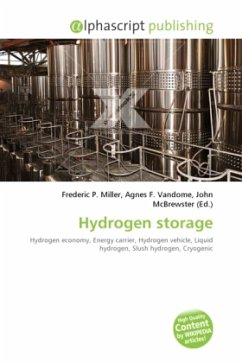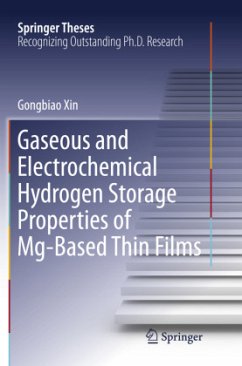
Hydrogen storage
Versandkostenfrei!
Versandfertig in 6-10 Tagen
36,99 €
inkl. MwSt.

PAYBACK Punkte
18 °P sammeln!
High Quality Content by WIKIPEDIA articles! Hydrogen storage describes the methods for storing H2 for subsequent use. The methods span many approaches, including high pressures and cryogenics, but usually focus on chemical compounds that reversibly release H2 upon heating. Hydrogen storage is a topical goal in the development of a hydrogen economy. Most research into hydrogen storage is focused on storing hydrogen as a lightweight, compact energy carrier for mobile applications. Liquid hydrogen or slush hydrogen with a higher volumetric energy density may be used. However liquid hydrogen requi...
High Quality Content by WIKIPEDIA articles! Hydrogen storage describes the methods for storing H2 for subsequent use. The methods span many approaches, including high pressures and cryogenics, but usually focus on chemical compounds that reversibly release H2 upon heating. Hydrogen storage is a topical goal in the development of a hydrogen economy. Most research into hydrogen storage is focused on storing hydrogen as a lightweight, compact energy carrier for mobile applications. Liquid hydrogen or slush hydrogen with a higher volumetric energy density may be used. However liquid hydrogen requires cryogenic storage and boils around 20.268 K. Hence, its liquefaction imposes a large energy loss. The tanks must also be well insulated to prevent boil off. Insulation by design for liquid hydrogen tanks is adding costs for this method. Liquid hydrogen has less energy density by volume than hydrocarbon fuels such as gasoline by approximately a factor of four. This highlights the density problem for pure hydrogen: there is actually about 64% more hydrogen in a liter of gasoline than there is in a liter of pure liquid hydrogen.












